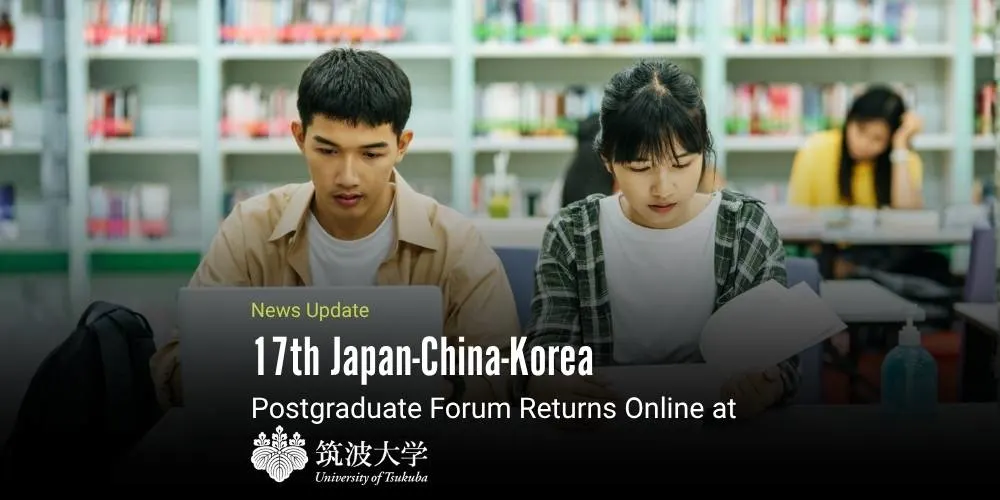University of Tsukuba Champions International Education Through Student-Led Forum
Cross-Border Academic Networking Returns with Japan-China-Korea Forum 2025
On 18 and 19 September, the University of Tsukuba hosted the 17th Japan-China-Korea Postgraduate Forum, which was conducted entirely online over two days. This was an inaugural online forum in three years and brought together international students from all over East Asia to share research and nurture postgraduate academic networking. Tsukuba student leaders from several different graduate degree programs led the organising efforts for the forum. Their activities included the icebreaker, attended by Jing Gao, Henry Chinonso Nwogba, Hangyu Gao, and Wen Wei, that helped students to get to know each other in a relaxed space. Their contributions helped set up a lively atmosphere promoting inclusiveness while supporting cross-cultural research opportunities.
In July, a workshop aimed at improving the presentation skills of students was held by Professor Yingnan Yang of the Doctoral Program in Bioindustrial Sciences. About 20 students attended and listened to the presentation on the accurate data representation, visual clarity, and communication techniques illustrated using real student slides. The workshop concluded with a question-and-answer session, where many students reported they intended to apply the tips they received in their future presentations.
The forum itself had 100 participants altogether. Of these, 23 belonged to the University of Tsukuba, three were garnered from Hokkaido University, and the rest were two from the Kyoto University of Advanced Science. Mostly, 71 participants were Chinese and came from different institutions, such as China Geological University and China Agricultural University. Only one representative in Korea comes from Korea University. Very strong evidence of this participation, however, was actually the global university collaboration's strength and efficiency in East Asia academic exchange.
Twenty Tsukuba students also partnered with students from other institutions to fulfil the role of session chairs, assisting in timekeeping and facilitating Q&A. A large number of attendees explored sessions other than their presentations because of their high interest in academic research and communication skills. Presentations conducted during sessions held by students from the University of Tsukuba received awards. Ten students got Gold Awards, six earned Silver, and three were recognised with Bronze. These awards were a reflection of the excellent standard of postgraduate education and students' commitment to excellence in research.
It ended with a good ice-breaker by student organisers with slides having photos and comments talking about celebrating the spirit of collaboration. It will continue the tradition of the Next Japan-China-Korea Postgraduate Forum hosted by China Agricultural University in 2026 about student exchange programs and shared learning beyond boundaries. This is a long-standing initiative that has established an important platform for postgraduate students to showcase their work, network with others, and contribute to meaningful academic research across the region.
Editor’s Note
This forum is an excellent model of what postgraduate study must be like: cooperative, global, and based on actual academic discussion. The Japan-China-Korea Postgraduate Forum at the University of Tsukuba demonstrates how much is gained when students and scholars from various nations sit down together to exchange ideas and encourage each other. It's heartening to observe that not only are international students sharing their work, but also driving sessions and establishing networks. Such team-building and leadership are what global university cooperation requires. The combination of awards, workshops, and collaborative learning demonstrates that this is more than a ceremonial occasion; it is an active, developing platform for academic study and student exchange programs. Students had shown sincere interest in each other’s work, showing up at sessions other than their own presentations, handling Q&As, and attending feedback; these are all indicators of a strong and positive academic culture. The forum also provided room for practical skill-building, which is sometimes neglected in conventional environments.
Skoobuzz asserts that this is more than merely a conference. It's an example of how graduate degree programs can instil creativity and innovation, establish lasting networks, and provide access to cross-cultural research ventures.
FAQs
1. What is the Japan-China-Korea Postgraduate Forum?
The Japan-China-Korea Postgraduate Forum is an academic event where postgraduate students from Japan, China, and Korea come together to share research, improve presentation skills, and build international friendships. It helps students learn from each other and encourages collaboration across borders.
2. How can international students join the postgraduate forum?
International students can take part by being enrolled in one of the participating universities. They may be invited to present their research, help organise sessions, or join as attendees. Students often apply through their academic programmes or are selected by their professors.
3. Which universities participate in the Japan-China-Korea Forum?
Several universities from East Asia take part. These include the University of Tsukuba, Hokkaido University, Kyoto University of Advanced Science, China University of Geosciences, China Agricultural University, and Korea University, along with many others from the region.
4. What topics are covered in postgraduate forums?
The forum covers a wide range of subjects linked to academic research. These include environmental science, life sciences, agricultural studies, geosciences, and bioindustrial innovation. It also includes workshops on presentation skills and communication, helping students grow professionally.
5. How does the University of Tsukuba support international education?
The University of Tsukuba supports international education by hosting global events like this forum, offering diverse graduate degree programmes, and encouraging student exchange programmes. It helps students connect with others from different countries and promotes learning through shared research and cultural activities.














0 Comments (Please Login To Continue)